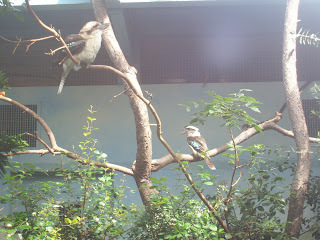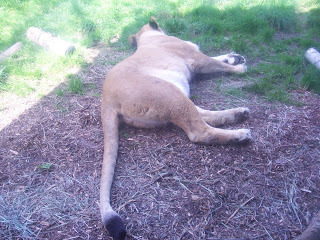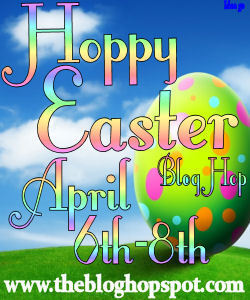Frances Pauli's Blog, page 18
April 17, 2012
Original! Anything new under the sun?
Is there really anything more off-putting than revealing your next, fantastic story idea only to have the listener say, "Oh, yeah. That's exactly like this one episode of Desperate Housewives?" Or maybe, "Hey, I saw that in a porno once."
Okay, probably extreme examples, but still. We do want to be original, don't we? We definitely don't want to find out that our pet story seed has been done--and re-done--to the point that it's recognizable or cliche. I don't, at least, and I suspect that's a pretty universal opinion. As authors, we want to stand out. We want to create something never before seen or imagined. It's kind of what we do.
So when you figure out that just about every story line, plot structure, or imagined saga has, in one way or another, already been done, it can be a real set-back. We learn it early on--three basic themes, thirty some odd stories in existence that everything fits into. But those are vagaries, they are generalized themes and formulas and within them, we always believe that we can still create something completely and utterly "new."
Except, I'm not so sure we can. I'm not convinced their is anything new under the sun. Also, I'm not convinced that it matters at all. Newness, you see, is overrated. Originality, however, is another thing all together. I suspect, that is where some confusion takes place.
A story can be retold. In fact, it's meant to be. Oral tradition arises out of the retelling over and over of favorite tales. Myths are meant to be relived repeatedly. This familiarity, rather than weakening the tale, gives it power. It resonates with us more deeply because on some level, we "know" it.
We are, however, easily bored creatures. We lust for newness, despite our love of comfortable old shoes, worn out jeans and t-shirts with the most holes in them from loving abuse. And so the trick becomes not to tell a new story, but to tell a familiar story in a new way. In other words, it isn't what story you tell, but how you tell it that will make it stand out as spectacular.
And of course, the way to do that is to use your own, distinct voice. Infuse the tale with your personal passions, your unique, possibly twisted view of the world. Because we as people are unique and individual, the more of your self you allow onto the page, the better your chances of hitting that original strike.
Best of luck at it!
~ Frances
Okay, probably extreme examples, but still. We do want to be original, don't we? We definitely don't want to find out that our pet story seed has been done--and re-done--to the point that it's recognizable or cliche. I don't, at least, and I suspect that's a pretty universal opinion. As authors, we want to stand out. We want to create something never before seen or imagined. It's kind of what we do.
So when you figure out that just about every story line, plot structure, or imagined saga has, in one way or another, already been done, it can be a real set-back. We learn it early on--three basic themes, thirty some odd stories in existence that everything fits into. But those are vagaries, they are generalized themes and formulas and within them, we always believe that we can still create something completely and utterly "new."
Except, I'm not so sure we can. I'm not convinced their is anything new under the sun. Also, I'm not convinced that it matters at all. Newness, you see, is overrated. Originality, however, is another thing all together. I suspect, that is where some confusion takes place.
A story can be retold. In fact, it's meant to be. Oral tradition arises out of the retelling over and over of favorite tales. Myths are meant to be relived repeatedly. This familiarity, rather than weakening the tale, gives it power. It resonates with us more deeply because on some level, we "know" it.
We are, however, easily bored creatures. We lust for newness, despite our love of comfortable old shoes, worn out jeans and t-shirts with the most holes in them from loving abuse. And so the trick becomes not to tell a new story, but to tell a familiar story in a new way. In other words, it isn't what story you tell, but how you tell it that will make it stand out as spectacular.
And of course, the way to do that is to use your own, distinct voice. Infuse the tale with your personal passions, your unique, possibly twisted view of the world. Because we as people are unique and individual, the more of your self you allow onto the page, the better your chances of hitting that original strike.
Best of luck at it!
~ Frances
Published on April 17, 2012 02:53
April 16, 2012
Next! Too many stories, not enough time!
I started writing because I had too many stories. I'd been collecting them for so long, you see, procrastinating, that they didn't fit in my head anymore. I wrote down notes. I made a list, but eventually I figured out that I had forgotten what the notes meant. I'd lost a few.
That single thought, and the following panic attack, was enough impetus to force me to get writing. I want to save them all, to keep every little seed of story and preserve it. . . which, of course, is idiotic.
You can't do it. At least, I can't. My head is way too full of imaginings, and I've learned that for every one I manage to ooze onto paper, I can think of a few more. Now, rather than tempt my muse into hiding, that's not a brag at all. I still live in fear of the well "drying up" so to speak. I've just come to terms with the fact, that I may not get every single tale safely into book form before I die. I'm okay with that....mostly.
But I still have the too many story problem. Lately, it just manifests in a different way. I'll be well up to my elbows in one project, passionate, driven, totally immersed, and I'll think up a new story that absolutely has to be written NOW. Which, of course, would mean nothing ever got written, not finished that is.
I'm doing a fair job of ignoring the jabbing from the "NEXT" story, but they are starting to pile up. Now I have to make decisions like, "when I finish this book, will I do X or Y next?" Next is very close to driving me batty. I know I'm not the only one who has more stories vying for attention than they have time to actually sit down and put words on paper, so I'm going to take today and ask you all a question....
How the heck do you pick the "next" story you work on?
That's assuming deadlines and editors don't help you out by demanding something specific, of course. That, at least, makes the choosing easier. (or it should) So let me have it. What's your strategy?
And no claiming you listen to the one that's "speaking to you the loudest." Heard it. Let's assume they're all clamoring at the top of their lungs. ;)
~ Frances
That single thought, and the following panic attack, was enough impetus to force me to get writing. I want to save them all, to keep every little seed of story and preserve it. . . which, of course, is idiotic.
You can't do it. At least, I can't. My head is way too full of imaginings, and I've learned that for every one I manage to ooze onto paper, I can think of a few more. Now, rather than tempt my muse into hiding, that's not a brag at all. I still live in fear of the well "drying up" so to speak. I've just come to terms with the fact, that I may not get every single tale safely into book form before I die. I'm okay with that....mostly.
But I still have the too many story problem. Lately, it just manifests in a different way. I'll be well up to my elbows in one project, passionate, driven, totally immersed, and I'll think up a new story that absolutely has to be written NOW. Which, of course, would mean nothing ever got written, not finished that is.
I'm doing a fair job of ignoring the jabbing from the "NEXT" story, but they are starting to pile up. Now I have to make decisions like, "when I finish this book, will I do X or Y next?" Next is very close to driving me batty. I know I'm not the only one who has more stories vying for attention than they have time to actually sit down and put words on paper, so I'm going to take today and ask you all a question....
How the heck do you pick the "next" story you work on?
That's assuming deadlines and editors don't help you out by demanding something specific, of course. That, at least, makes the choosing easier. (or it should) So let me have it. What's your strategy?
And no claiming you listen to the one that's "speaking to you the loudest." Heard it. Let's assume they're all clamoring at the top of their lungs. ;)
~ Frances
Published on April 16, 2012 01:40
April 14, 2012
Magna Carta! Advice from Nanowrimo
When I tried out Nanowrimo for the first time, I read Chris Baty's book, No Plot, No Problem! from cover to cover. Since then, I've read most if not all of it each year. It's a very good book. Whether or not I continue to participate in the event, or at what capacity, I will continue to refer back to the volume for advice, motivation, and tips on keeping the words flowing. It's one of my (very few) repeated reads.
Today, for "M," I thought I would share my favorite little writing tip/exercise from the book. Baty calls these two lists your "magna cartas" and I use them as a map of what not to include in your writing, and what to absolutely include. It seems like a simple premise, write the kind of things you like to read about, but honestly, if you're not very careful to keep them in mind, a lot of things that you prefer NOT to read about have an insidious way of slipping into your writing. On top of that, your Magna Cartas may change over time. I know mine have. At least a little. Just like developing a taste for asparagus, I have grown less cringy about vampire's in fiction. I've enjoyed a few vampire stories, and I've written a few...very few, as well.
So, writing the MC is step one. Paying attention to it is step two, and I'll add that keeping it current is step three. Even if you only write them and forget them, the exercise is worth your time and introspection. So, for Magna Carta one, you make a list of all the things you really love to find in books you read.
Mine looks a little bit like this:
True love
Sympathetic Villains
Unexpected Twists
Magic
Unusual Aliens
Quirky minor characters
Humor/wit
Mysterious items or artifacts
Exotic locations
You get the idea. Then for Magna Carta two you make a list of things you HATE to read about in a story. The things that put you off and damage your enjoyment of a book. Mine goes like this:
True horrors (rape, violence against children, torture etc)
Shallow Characters
Only pretty people
Depressing story lines
Flawless protagonists
Author interjections (passages of botany research or linguistics*)
Explaining things that are easily deduced
So, then you have at least a basic map of what you do and don't want to allow into your own writing, and they will be absolutely different for each person.
It's a fun and fast little process, and really great to do with a group where you can compare lists and giggle.
Why not give it a try?
*my apologies to Mr. Tolkien, whose books I did thoroughly enjoy even though I don't care at all what the derivation of the Elvin word for tree is.
~ Frances
Today, for "M," I thought I would share my favorite little writing tip/exercise from the book. Baty calls these two lists your "magna cartas" and I use them as a map of what not to include in your writing, and what to absolutely include. It seems like a simple premise, write the kind of things you like to read about, but honestly, if you're not very careful to keep them in mind, a lot of things that you prefer NOT to read about have an insidious way of slipping into your writing. On top of that, your Magna Cartas may change over time. I know mine have. At least a little. Just like developing a taste for asparagus, I have grown less cringy about vampire's in fiction. I've enjoyed a few vampire stories, and I've written a few...very few, as well.
So, writing the MC is step one. Paying attention to it is step two, and I'll add that keeping it current is step three. Even if you only write them and forget them, the exercise is worth your time and introspection. So, for Magna Carta one, you make a list of all the things you really love to find in books you read.
Mine looks a little bit like this:
True love
Sympathetic Villains
Unexpected Twists
Magic
Unusual Aliens
Quirky minor characters
Humor/wit
Mysterious items or artifacts
Exotic locations
You get the idea. Then for Magna Carta two you make a list of things you HATE to read about in a story. The things that put you off and damage your enjoyment of a book. Mine goes like this:
True horrors (rape, violence against children, torture etc)
Shallow Characters
Only pretty people
Depressing story lines
Flawless protagonists
Author interjections (passages of botany research or linguistics*)
Explaining things that are easily deduced
So, then you have at least a basic map of what you do and don't want to allow into your own writing, and they will be absolutely different for each person.
It's a fun and fast little process, and really great to do with a group where you can compare lists and giggle.
Why not give it a try?
*my apologies to Mr. Tolkien, whose books I did thoroughly enjoy even though I don't care at all what the derivation of the Elvin word for tree is.
~ Frances
Published on April 14, 2012 01:21
April 12, 2012
Kookaburra! Taking a day off
I played hookie this week and went to the zoo...so here's a Kookaburra for "K"


Bears! eeek.



 Cthulhu?
Cthulhu?
We went to the aquarium too.
 Seahorses are my favorite..
Seahorses are my favorite..
And feature in one way or another in many of my stories! :) Thanks everyone for such a great A-Z month of blogging!
:) Thanks everyone for such a great A-Z month of blogging!
~ Frances (who needed a vacation very, very much)


Bears! eeek.




 Cthulhu?
Cthulhu?We went to the aquarium too.

 Seahorses are my favorite..
Seahorses are my favorite..And feature in one way or another in many of my stories!
 :) Thanks everyone for such a great A-Z month of blogging!
:) Thanks everyone for such a great A-Z month of blogging!~ Frances (who needed a vacation very, very much)
Published on April 12, 2012 03:23
April 11, 2012
Jaleta! The best part of networking
Networking is a must do if you're an author, heck, maybe it is in any business. It scared me at first. Like many authors, I'm something of an introvert--except on paper. But the experts said you must network, mingle, converse, and so out I went into the wide, writerly world to make contacts.
So scary.
Years later, I have a different take on it. You see, those contacts are your support structure. They're your team, and you're theirs (keep that reciprocation in mind at all times). The contacts you make in the field, at conventions, on forums, boards and blog fests, are the most valuable resource you can imagine. Trust me. Networking provides information that can save you from making huge mistakes. It provides a wider reach for you to promote and share your work. Networking, good.
But the best part is the one I never, ever would have guessed at. Through this networking magic, I have met some of the most amazing people. Talented people, helpful people, kind-hearted, supportive, wonderful people. I've made friends out there, and I mean real ones. Treasures. Friends like Jaleta Clegg, whose book was so engaging I had to take my shiny new e-reader into the bathtub to finish it. (not joking)
Friends who cross country to visit, who can bring their whole family to your house for days and days, and you still are sad to see them go. (seriously, not kidding)
That, my fellow networkers, is a real bonus.
~Frances
So scary.
Years later, I have a different take on it. You see, those contacts are your support structure. They're your team, and you're theirs (keep that reciprocation in mind at all times). The contacts you make in the field, at conventions, on forums, boards and blog fests, are the most valuable resource you can imagine. Trust me. Networking provides information that can save you from making huge mistakes. It provides a wider reach for you to promote and share your work. Networking, good.
But the best part is the one I never, ever would have guessed at. Through this networking magic, I have met some of the most amazing people. Talented people, helpful people, kind-hearted, supportive, wonderful people. I've made friends out there, and I mean real ones. Treasures. Friends like Jaleta Clegg, whose book was so engaging I had to take my shiny new e-reader into the bathtub to finish it. (not joking)
Friends who cross country to visit, who can bring their whole family to your house for days and days, and you still are sad to see them go. (seriously, not kidding)
That, my fellow networkers, is a real bonus.
~Frances
Published on April 11, 2012 03:49
April 10, 2012
Indie! Nurturing An Independent Streak
An independent spirit used to be considered a good thing. Self-starter was a compliment, it got teacher's and boss's attention--in a good way.
In film, independent has become a stamp of quality. Big budget films rock. They're commercial, but the "Indies" are where you expect the art to happen. They have indie awards, indie festivals. You just say the name, independent film, and people expect a level of cutting edge, artistic merit.
So I have to wonder how the publishing world has done such a great job of equating Indie with a big old stamp that says "crap." I don't get it. Or, maybe I do. The last thing a struggling industry needs is competition on a huge scale. Still, I like the idea of incorporating a little art and shine to the term Indie book.
I know there is a lot of quality concerns. You hear, "if anyone can publish their work, the reader will be unable to find what is good among all the crud." Well, how did film manage then? They employed the aforementioned, awards, festivals, etc. I honestly think independent authors could do a bang up job of self-screening, of organizing and Indie festival.
Of course, I also think readers are doing that on their own. I'm just about a hundred percent sure they already have a quality control infrastructure in the works. Book bloggers come to mind. Reader reviews do as well. I can imagine Reader Awards too. But then, I give readers a lot of credit for intelligence and craftiness.
I think the only way to get rid of that sneer behind the term "indie author" is to continue to prove it wrong. I look forward to hearing about Indie Excellence in fiction. I'm guessing that it's just around the corner.
~Frances
In film, independent has become a stamp of quality. Big budget films rock. They're commercial, but the "Indies" are where you expect the art to happen. They have indie awards, indie festivals. You just say the name, independent film, and people expect a level of cutting edge, artistic merit.
So I have to wonder how the publishing world has done such a great job of equating Indie with a big old stamp that says "crap." I don't get it. Or, maybe I do. The last thing a struggling industry needs is competition on a huge scale. Still, I like the idea of incorporating a little art and shine to the term Indie book.
I know there is a lot of quality concerns. You hear, "if anyone can publish their work, the reader will be unable to find what is good among all the crud." Well, how did film manage then? They employed the aforementioned, awards, festivals, etc. I honestly think independent authors could do a bang up job of self-screening, of organizing and Indie festival.
Of course, I also think readers are doing that on their own. I'm just about a hundred percent sure they already have a quality control infrastructure in the works. Book bloggers come to mind. Reader reviews do as well. I can imagine Reader Awards too. But then, I give readers a lot of credit for intelligence and craftiness.
I think the only way to get rid of that sneer behind the term "indie author" is to continue to prove it wrong. I look forward to hearing about Indie Excellence in fiction. I'm guessing that it's just around the corner.
~Frances
Published on April 10, 2012 03:40
April 9, 2012
Heroes! Holy Idols, Batman!
Well I figured today I'd do something less "seriously on topic," and go with a little bit of fun.
So no, I'm not going to discuss heroes in fiction, how I write heroes, heroic characteristics or anything remotely related to dashing, fictional protagonists (or love interests) men in stretchy suits, or cape-wearing crime fighters.
But, that would be a fun post too, wouldn't it?
Instead I thought I'd take a breather and just do a list. It's kind of cheating, but it tuns out a blog a day for a month is a LOT.
Besides, its a good thing to keep your eye on your own heroes, the people you aspire to be like, the ones whose level you would love to rise to. With that in mind, I'll offer a list of my top, author heroes, and then ask y'all to chime in with your own. Who do you want to write like? Who's career do you wish you had? Who is the one you read when you want to remember how this story making thing should go?
My Author Heroes:
Andre Norton
Tanith Lee
Ann McCaffrey
Patricia McKillip
Christopher Moore
Gregory MacGuire
William Shakespeare
Douglas Adams
It's a bit of all over the place, eh? They say diversity equals strength...or at least, I say it.
Okay, who do you pick?
~ Frances
So no, I'm not going to discuss heroes in fiction, how I write heroes, heroic characteristics or anything remotely related to dashing, fictional protagonists (or love interests) men in stretchy suits, or cape-wearing crime fighters.
But, that would be a fun post too, wouldn't it?
Instead I thought I'd take a breather and just do a list. It's kind of cheating, but it tuns out a blog a day for a month is a LOT.
Besides, its a good thing to keep your eye on your own heroes, the people you aspire to be like, the ones whose level you would love to rise to. With that in mind, I'll offer a list of my top, author heroes, and then ask y'all to chime in with your own. Who do you want to write like? Who's career do you wish you had? Who is the one you read when you want to remember how this story making thing should go?
My Author Heroes:
Andre Norton
Tanith Lee
Ann McCaffrey
Patricia McKillip
Christopher Moore
Gregory MacGuire
William Shakespeare
Douglas Adams
It's a bit of all over the place, eh? They say diversity equals strength...or at least, I say it.
Okay, who do you pick?
~ Frances
Published on April 09, 2012 03:14
April 7, 2012
Guidelines! Not just casual reading
I'm going to take a day and talk a bit about something that is a pet peeve of mine. No, it's not that each publishing house, market, magazine or contest has its own unique set of guidelines. It's not that they can't agree on a font, size, margin measurement, or standard scene break symbol. Nor is it that the peripheral requirements continually vary from submission to submission. Some want a one page synopsis, some a three page. Sure. I can live with that. I've developed a pretty slick-and-quick routine for tweaking my manuscript to fit each specific guideline, and I can change my # to *** faster than you can say, revision....well almost that fast.
So what's the rant for? It does say G is for Guidelines, right?
You Betcha.
But the rant is about IGNORING guidelines. Its about getting your knickers in a self-righteous twist about all of the above and deciding that you don't really need to follow a different set of rules for each editor.
I still can't believe this happens, but it does. I am assured regularly that it's common as chips, and my single stint as an anthology editor proved it to my doubting mind. A lot of authors really do ignore the bloody guidelines. It doesn't matter how simple you make them, how clearly you explain, a good chunk of them will think the rules just don't apply to their brilliance. And while, I shall concede that you don't absolutely need to follow an editor's rules. I'll add that, in that case, you are fully welcome to publish on your own, without said editor. That is the one, viable option where you are welcome to completely ignore their guidelines. If, however, you are submitting to someone, I can only assume that you want them involved in the process.
And at that point, if you can't be bothered to follow their rules...I have to just scratch my head and wonder.
Because you know how competitive it is out there right? I don't care how much trouble you think it is to change your # to *** is it really worth making your chances even more slim? Even the most brilliant writing won't save you if your attitude ensures that nobody is going to bother reading it to find out what a gem you've sent them. You know that they won't read it, right? Not even if its on pretty paper? (Okay, especially not if its on pretty paper)
Do yourself a favor and take the next set of guidelines from whomever you are wooing, to heart.
Or strike out on your own and give up the wooing, I suppose. That is a very solid option these days. I'll get to it. Promise. Look for day "I" and see what I mean. :)
~ Frances
So what's the rant for? It does say G is for Guidelines, right?
You Betcha.
But the rant is about IGNORING guidelines. Its about getting your knickers in a self-righteous twist about all of the above and deciding that you don't really need to follow a different set of rules for each editor.
I still can't believe this happens, but it does. I am assured regularly that it's common as chips, and my single stint as an anthology editor proved it to my doubting mind. A lot of authors really do ignore the bloody guidelines. It doesn't matter how simple you make them, how clearly you explain, a good chunk of them will think the rules just don't apply to their brilliance. And while, I shall concede that you don't absolutely need to follow an editor's rules. I'll add that, in that case, you are fully welcome to publish on your own, without said editor. That is the one, viable option where you are welcome to completely ignore their guidelines. If, however, you are submitting to someone, I can only assume that you want them involved in the process.
And at that point, if you can't be bothered to follow their rules...I have to just scratch my head and wonder.
Because you know how competitive it is out there right? I don't care how much trouble you think it is to change your # to *** is it really worth making your chances even more slim? Even the most brilliant writing won't save you if your attitude ensures that nobody is going to bother reading it to find out what a gem you've sent them. You know that they won't read it, right? Not even if its on pretty paper? (Okay, especially not if its on pretty paper)
Do yourself a favor and take the next set of guidelines from whomever you are wooing, to heart.
Or strike out on your own and give up the wooing, I suppose. That is a very solid option these days. I'll get to it. Promise. Look for day "I" and see what I mean. :)
~ Frances
Published on April 07, 2012 03:16
April 6, 2012
Fiesta! Blog Hop Easter Party

I love a good FIESTA...and yes, I am crossing blog hops. Is that allowed? I imagine a ghost buster somewhere warning, "Don't cross the streams!" Oh well. One fun plus another equals more fun in my book. So for you A to Z bloggers, here's a blog fiesta to explore, and for you Blog Hoppers,check out the A to Z party too!
The more the merrier.For all of you, I'll make anyone from either hop who comments on the three blog hop days eligible for the drawing for the free ebook. You pick from my backlist to one lucky winner. Just make sure you leave an email so I can contact you if you win.
Happy Hopping!
~Frances
Published on April 06, 2012 03:35
April 5, 2012
Edit! The Ever Changing Story
This may seem like a contradiction coming in right on the tail of my post on drafts and my reluctance to "re-do" one. But while I refuse to waste a perfectly good effort by completely starting it over from scratch, I am in fact a big fan of reworking it.
Okay, maybe not a big fan. Editing is hard work. It takes a critical and objective eye which is usually beyond difficult to cultivate in reference to your own writing. But I love the process, just the same. I love the head banging frustration, the tears, the coffee guzzling, cussing and hair pulling. And that's just the round I do by myself. Fun stuff, that.
Sounds a bit like torture doesn't it? So why the affection?
Well, I went to art school. You can look at that two ways. #1 I've been programmed to enjoy a good critical beating :) and #2 I can really get into the so called "process" of creating. And let me tell ya, editing is where the process is at.
Don't get me wrong, writing that draft is art. But it's art in the pure, oozing form. At least for me it is. I liken it to mixing the paint, spinning the yarn, kneading the clay... pick a metaphor. But the editing stage, is really where you get to dig your hands in and get messy. It's the crafting stage, the tactile part. The part where I usually splatter black oil paint all over the ceiling. When I fully dive into editing/revising/reworking it feels a great deal to me like I'm weaving again. It feels like I've rolled up my sleeves and gotten my hands dirty.
I was a very messy artist.
I also do a little of the head banging and hair pulling when I paint.
Interesting.
Thankfully, rather than making things messier (which is good in painting, really) editing "process" tends to clean things up a bit. It's still a very visceral, engaged dancing with your creation, and I suspect that it fills that need for me now that I rarely pick up a paint brush. At least now the ceiling is safe. So far. I have yet to fling any plot up there...and the stains are so much easier to get out.
~ Frances
Okay, maybe not a big fan. Editing is hard work. It takes a critical and objective eye which is usually beyond difficult to cultivate in reference to your own writing. But I love the process, just the same. I love the head banging frustration, the tears, the coffee guzzling, cussing and hair pulling. And that's just the round I do by myself. Fun stuff, that.
Sounds a bit like torture doesn't it? So why the affection?
Well, I went to art school. You can look at that two ways. #1 I've been programmed to enjoy a good critical beating :) and #2 I can really get into the so called "process" of creating. And let me tell ya, editing is where the process is at.
Don't get me wrong, writing that draft is art. But it's art in the pure, oozing form. At least for me it is. I liken it to mixing the paint, spinning the yarn, kneading the clay... pick a metaphor. But the editing stage, is really where you get to dig your hands in and get messy. It's the crafting stage, the tactile part. The part where I usually splatter black oil paint all over the ceiling. When I fully dive into editing/revising/reworking it feels a great deal to me like I'm weaving again. It feels like I've rolled up my sleeves and gotten my hands dirty.
I was a very messy artist.
I also do a little of the head banging and hair pulling when I paint.
Interesting.
Thankfully, rather than making things messier (which is good in painting, really) editing "process" tends to clean things up a bit. It's still a very visceral, engaged dancing with your creation, and I suspect that it fills that need for me now that I rarely pick up a paint brush. At least now the ceiling is safe. So far. I have yet to fling any plot up there...and the stains are so much easier to get out.
~ Frances
Published on April 05, 2012 05:55



